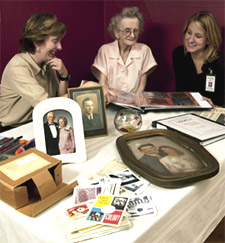by Chris Bryant and Linda Hill

Few things leave people feeling as helpless and stressed as caring for a seriously ill family member.
Dr. Rebecca Allen, associate professor of psychology at The University of Alabama, is working with the sick person and their families in efforts to alleviate some of the stress both groups experience. And, in the process, Allen is prompting families to develop a legacy likely to bring comfort and happiness in coming years.
“We are creating family heirlooms,” Allen said.
In an effort known as The Legacy Project, Allen and UA students are prompting families of those with life-limiting illnesses to develop keepsakes, such as a scrapbook, journal, photo album or an audiotape of life stories, focusing on a happy period in the ill person’s life. Allen is studying the impact such projects can have on the families.
When people are seriously ill, they often feel compelled to have meaningful conversations with family, Allen said. When these conversations lead the ill person to reflect upon their lives, a method the researchers refer to as “life review,” it can help them find meaning to their life, bringing comfort and a better ability to cope, she said. The process, when shared with family members, can also reduce stress for caregivers and assist them in coping.
Seventy percent of family caregivers report mild to moderate symptoms of depression when caring for a dying relative, reports indicate. Allen, who recently co-authored a study highlighted in the New England Journal of Medicine on the stress levels experienced by these caregivers, said in the new project she and her students meet with participating families in their homes over a period of some 6-8 weeks.
The UA researchers guide the families in the life review process and in how to start their Legacy Project. Family members selected to participate in the program are given gift certificates to use in buying needed supplies to construct their legacies.
“I think that it can be incredibly effective,” said Allen of family members working together on such a project. “For some families, all they are looking for is a nudge. We focus them in on happy memories.”
Those interested in participating can find out more by calling 205/348-0266. To qualify, the person receiving care must be 60 or older and have an incurable, life-limiting illness (such as advanced cancer, congestive heart failure, an illness requiring dialysis, etc.). The caregiver may be directly related to the patient, or related by marriage or friendship, and to qualify for the study should have regular contact with the patient and provide patient assistance with daily living activities.
Allen, who, in addition to working with the seriously ill, has also worked professionally with others dealing with severe trauma, says she learns much from them. “One of the fabulous things I have found is that I gain so much by being able to witness, at least on a weekly basis, the strength of the human spirit,” Allen said. “I have worked with combat veterans, women who have experienced sexual abuse, dementia caregivers, and palliative caregivers. By working with individuals who face pain and struggle each day, I learn perspective, self-efficacy, coping and peace.”
Allen is a researcher in UA’s Center for Mental Health and Aging, an interdisciplinary center designed to assist, in a variety of ways, the elderly and those who care for them.
The Legacy Project is co-funded with a grant from the Center for Mental Health and Aging and the National Institute on Aging.
Those age 60 and older who are interested in participating in one of the center’s many other treatment studies in areas such as chronic stress, anxiety, depression, or coping with life-limiting or non life-limiting illnesses, or the stresses associated with caring for someone in these categories, should contact Dr. Denise Cleveland, administrator for the Center for Mental Health and Aging, at 205/348-7512 or dclevela@sw.ua.edu.
Further Reading